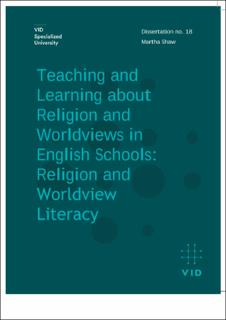| dc.description.abstract | The future of Religious Education (RE) in England and in wider Europe continues to be a matter of debate. In the UK particularly, there is a perceived crisis in RE, a large part of which relates to confusion over its aims and purposes and to the challenge of keeping up with a changing religion and worldview landscape. Within these debates the term ‘religious literacy’ has gained considerable currency and is widely accepted as an educational aim. The phrase is increasingly used both within RE and more broadly in a range of professions and settings to describe a level of knowledge and understanding about the diverse religion and worldview landscape and the skills to be able to engage with that diversity in a positive way.
The idea of religious literacy has been theorised in a general context, yet despite its increasing usage, there is no agreed, shared definition of what constitutes religious literacy, or what it looks like in the educational context specifically. This thesis explores the idea of religious literacy and its application in school classrooms. I draw on findings from a national study into stakeholders’ views on the future of teaching and learning about religion and worldviews in schools to challenge the idea of religious literacy. These findings illustrate the key role of RE in preparing young people to live in diversity, yet also reveal a complex nexus of values underpinning teachers’ practice and an appetite for an overhaul of content and new representations of religion and worldviews in curricula that better reflect the changing reality, as evidenced in sociological research.
I explore the potential of ‘religious literacy’ to reconcile stakeholders’ aspirations for the purpose and content of learning in RE, in its application to the context of the school classroom. I conclude that whilst religious literacy is useful as a theoretical model, its application in the classroom requires modification. These modifications relate to: 1) the explicit extension of ‘religion’ to ‘worldview’ to better categorise lived reality and diversity 2) a focus on the construction of knowledge 3) the foregrounding of a reflexive element in understanding and 4) moving from a linear to a circular model. My analysis extends religious literacy from a theoretical model applicable to a range of settings, to a pedagogical model of Religion & Worldview (R&W) literacy. I argue that as a model of educational praxis, R&W literacy better meets the aspirations of stakeholders and has potential to reconcile some of the key debates around both the purpose of RE and the representation of religion in curricula.
Paper I : Dinham, A. & Shaw, M. (2017) Religious literacy through religious education: The future of teaching and learning about religion and belief. Religions, 8(7). https://doi.org/10.3390/rel8070119
Paper II : Shaw, M. (2020) Values underpinning teachers’ practice in religious education – A values typology for RE
Currently under review with the Journal of Beliefs and Values.
Paper III : Shaw, M. (2018) New representations of religion and belief in schools. Religions, 9 (11). https://doi.org/10.3390/rel9110364 | en_US |
